| ID |
Date |
Author |
Topic |
Subject |
|
2857
|
24 Sep 2024 |
Stefan Ritt | Info | News MSCB++ API | > Where is the example of error handling?
#include "mscbxx.h"
#include "mexcept.h"
...
try {
// connect to node 10 at submaster mscb123
midas::mscb m("mscb123", 10);
// print a variable
std::cout << m["Input0"] << std::endl;
} catch (mexception e) {
std::cout << e << std::endl; // simply print exception
}
... |
|
1731
|
08 Nov 2019 |
Pierre Gorel | Bug Report | Newly installed MIDAS on OSX: mhttpd crahes | Context: out of the box MIDAS (using cmake) on OSX Mojave.
Running with mongoose/opensslm installation following instruction here:
https://midas.triumf.ca/MidasWiki/index.php/Quickstart_Linux
mhttpd crashing when midas webpage opened with Safari (12.1.2). Usually when opening the "chat" tab but sometimes also with the "message" tab.
mhttpd(11109,0x70000827a000) malloc: *** error for object 0x7f8669501ef0: pointer being freed was not allocated
mhttpd(11109,0x70000827a000) malloc: *** set a breakpoint in malloc_error_break to debug
No crash if using firefox (70.0.1 (64-bit)) |
|
1732
|
12 Nov 2019 |
Konstantin Olchanski | Bug Report | Newly installed MIDAS on OSX: mhttpd crahes | > Context: out of the box MIDAS (using cmake) on OSX Mojave.
>
> Running with mongoose/opensslm installation following instruction here:
> https://midas.triumf.ca/MidasWiki/index.php/Quickstart_Linux
>
> mhttpd crashing when midas webpage opened with Safari (12.1.2). Usually when opening the "chat" tab but sometimes also with the "message" tab.
> mhttpd(11109,0x70000827a000) malloc: *** error for object 0x7f8669501ef0: pointer being freed was not allocated
> mhttpd(11109,0x70000827a000) malloc: *** set a breakpoint in malloc_error_break to debug
>
> No crash if using firefox (70.0.1 (64-bit))
I think we also have reports of mhttpd crash on macos with safari from the Dragon experiment,
but cannot reproduce the problem.
If you can reproduce this, can you capture the crash stack trace?
One way to do this is to enable core dumps in odb "/expt/enable core dumps" set to "y", restart mhttpd,
wait for the crash. I think macos writes core dumps into /cores/... Or you can run mhttpd inside lldb
and wait for the crash. the lldb command to show the stack trace is "bt", but you may need
to switch to different threads to see which one actually crashed. I forget what the command
for that is.
BTW, the mhttpd networking code has not changed in a long time, but an update
of mongoose web server library is overdue (to fix a memory leak, at least).
K.O. |
|
1734
|
15 Nov 2019 |
Pierre Gorel | Bug Report | Newly installed MIDAS on OSX: mhttpd crahes | It is reproducible alright.
Here are the core dump and the backtrace (I think the former is more informative).
> > Context: out of the box MIDAS (using cmake) on OSX Mojave.
> >
> > Running with mongoose/opensslm installation following instruction here:
> > https://midas.triumf.ca/MidasWiki/index.php/Quickstart_Linux
> >
> > mhttpd crashing when midas webpage opened with Safari (12.1.2). Usually when opening the "chat" tab but sometimes also with the "message" tab.
> > mhttpd(11109,0x70000827a000) malloc: *** error for object 0x7f8669501ef0: pointer being freed was not allocated
> > mhttpd(11109,0x70000827a000) malloc: *** set a breakpoint in malloc_error_break to debug
> >
> > No crash if using firefox (70.0.1 (64-bit))
>
> I think we also have reports of mhttpd crash on macos with safari from the Dragon experiment,
> but cannot reproduce the problem.
>
> If you can reproduce this, can you capture the crash stack trace?
>
> One way to do this is to enable core dumps in odb "/expt/enable core dumps" set to "y", restart mhttpd,
> wait for the crash. I think macos writes core dumps into /cores/... Or you can run mhttpd inside lldb
> and wait for the crash. the lldb command to show the stack trace is "bt", but you may need
> to switch to different threads to see which one actually crashed. I forget what the command
> for that is.
>
> BTW, the mhttpd networking code has not changed in a long time, but an update
> of mongoose web server library is overdue (to fix a memory leak, at least).
>
> K.O. |
| Attachment 1: mhttpd_lldb_bt.txt
|
SnoGlobe:~/packages/midas/build> lldb mhttpd
(lldb) target create "mhttpd"
Current executable set to 'mhttpd' (x86_64).
(lldb) r
Process 15988 launched: '/Users/acquis/packages/midas/bin/mhttpd' (x86_64)
Mongoose web server will use SSL certificate file "/Users/acquis/online/ssl_cert.pem"
Mongoose web server will use authentication realm "snoglobe", password file "/Users/acquis/online/htpasswd.txt"
mongoose web server is redirecting HTTP port 8080 to https://SnoGlobe.local:8443
mongoose web server is listening on the HTTP port 8080
mongoose web server is listening on the HTTPS port 8443
mhttpd(15988,0x70000146e000) malloc: *** error for object 0x100608790: pointer being freed was not allocated
mhttpd(15988,0x70000146e000) malloc: *** set a breakpoint in malloc_error_break to debug
Process 15988 stopped
* thread #2, stop reason = signal SIGABRT
frame #0: 0x00007fff7456c2c6 libsystem_kernel.dylib`__pthread_kill + 10
libsystem_kernel.dylib`__pthread_kill:
-> 0x7fff7456c2c6 <+10>: jae 0x7fff7456c2d0 ; <+20>
0x7fff7456c2c8 <+12>: movq %rax, %rdi
0x7fff7456c2cb <+15>: jmp 0x7fff74566457 ; cerror_nocancel
0x7fff7456c2d0 <+20>: retq
Target 0: (mhttpd) stopped.
(lldb) bt
* thread #2, stop reason = signal SIGABRT
* frame #0: 0x00007fff7456c2c6 libsystem_kernel.dylib`__pthread_kill + 10
frame #1: 0x00007fff74627bf1 libsystem_pthread.dylib`pthread_kill + 284
frame #2: 0x00007fff744d66a6 libsystem_c.dylib`abort + 127
frame #3: 0x00007fff745e5077 libsystem_malloc.dylib`malloc_vreport + 545
frame #4: 0x00007fff745e4e38 libsystem_malloc.dylib`malloc_report + 151
frame #5: 0x000000010004fe53 mhttpd`AuthEntry::~AuthEntry(this=0x0000000101300220) at mhttpd.cxx:16983:8
frame #6: 0x000000010004fe25 mhttpd`AuthEntry::~AuthEntry(this=0x0000000101300220) at mhttpd.cxx:16983:8
frame #7: 0x000000010004fe09 mhttpd`std::__1::allocator<AuthEntry>::destroy(this=0x00000001001b0f10, __p=0x0000000101300220) at memory:1880:64
frame #8: 0x000000010004fddd mhttpd`void std::__1::allocator_traits<std::__1::allocator<AuthEntry> >::__destroy<AuthEntry>((null)=std::__1::true_type @ 0x000070000146cc28, __a=0x00000001001b0f10, __p=0x0000000101300220) at memory:1742:18
frame #9: 0x000000010004fd9d mhttpd`void std::__1::allocator_traits<std::__1::allocator<AuthEntry> >::destroy<AuthEntry>(__a=0x00000001001b0f10, __p=0x0000000101300220) at memory:1595:14
frame #10: 0x000000010004fd58 mhttpd`std::__1::__vector_base<AuthEntry, std::__1::allocator<AuthEntry> >::__destruct_at_end(this=0x00000001001b0f00, __new_last=0x0000000101300220) at vector:421:9
frame #11: 0x000000010004fc68 mhttpd`std::__1::__vector_base<AuthEntry, std::__1::allocator<AuthEntry> >::clear(this=0x00000001001b0f00) at vector:364:29
frame #12: 0x000000010004ff76 mhttpd`std::__1::vector<AuthEntry, std::__1::allocator<AuthEntry> >::clear(this=0x00000001001b0f00 size=1) at vector:766:17
frame #13: 0x00000001000494d3 mhttpd`read_passwords(auth=0x00000001001b0ec8) at mhttpd.cxx:17047:20
frame #14: 0x00000001000519d5 mhttpd`handle_http_message(nc=0x0000000100608860, msg=0x000070000146d5a0) at mhttpd.cxx:17719:20
frame #15: 0x00000001000499e0 mhttpd`handle_http_event_mg(nc=0x0000000100608860, ev=100, ev_data=0x000070000146d5a0) at mhttpd.cxx:17765:7
frame #16: 0x00000001000650db mhttpd`mg_call(nc=0x0000000100608860, ev_handler=(mhttpd`handle_http_event_mg(mg_connection*, int, void*) at mhttpd.cxx:17760), ev=100, ev_data=0x000070000146d5a0)(mg_connection*, int, void*), int, void*) at mongoose6.cxx:2120:5
frame #17: 0x000000010006c92b mhttpd`mg_http_call_endpoint_handler(nc=0x0000000100608860, ev=100, hm=0x000070000146d5a0) at mongoose6.cxx:4945:3
frame #18: 0x000000010006c7c5 mhttpd`mg_http_handler(nc=0x0000000100608860, ev=3, ev_data=0x000070000146dbcc) at mongoose6.cxx:5139:5
frame #19: 0x00000001000650db mhttpd`mg_call(nc=0x0000000100608860, ev_handler=(mhttpd`mg_http_handler(mg_connection*, int, void*) at mongoose6.cxx:4974), ev=3, ev_data=0x000070000146dbcc)(mg_connection*, int, void*), int, void*) at mongoose6.cxx:2120:5
frame #20: 0x00000001000670c8 mhttpd`mg_recv_common(nc=0x0000000100608860, buf=0x0000000100801000, len=401) at mongoose6.cxx:2676:3
frame #21: 0x0000000100066f83 mhttpd`mg_if_recv_tcp_cb(nc=0x0000000100608860, buf=0x0000000100801000, len=401) at mongoose6.cxx:2680:3
frame #22: 0x0000000100069d32 mhttpd`mg_read_from_socket(conn=0x0000000100608860) at mongoose6.cxx:3378:7
frame #23: 0x00000001000695f6 mhttpd`mg_mgr_handle_conn(nc=0x0000000100608860, fd_flags=1, now=1573832400.4958119) at mongoose6.cxx:3511:9
frame #24: 0x0000000100065b74 mhttpd`::mg_mgr_poll(mgr=0x000070000146ded8, timeout_ms=1000) at mongoose6.cxx:3687:5
frame #25: 0x0000000100076087 mhttpd`per_connection_thread_function(param=0x0000000100608860) at mongoose6.cxx:3805:5
frame #26: 0x00007fff746252eb libsystem_pthread.dylib`_pthread_body + 126
frame #27: 0x00007fff74628249 libsystem_pthread.dylib`_pthread_start + 66
frame #28: 0x00007fff7462440d libsystem_pthread.dylib`thread_start + 13
(lldb) .q
|
| Attachment 2: mhttpd_2019-11-15-104252_SnoGlobe.crash
|
Process: mhttpd [16037]
Path: /Users/USER/*/mhttpd
Identifier: mhttpd
Version: 0
Code Type: X86-64 (Native)
Parent Process: tcsh [16008]
Responsible: mhttpd [16037]
User ID: 501
Date/Time: 2019-11-15 10:42:51.751 -0500
OS Version: Mac OS X 10.14.6 (18G95)
Report Version: 12
Anonymous UUID: 27D16641-6679-1AAE-440D-3CF11831B5B1
Sleep/Wake UUID: 6841695D-3153-4F9B-A340-F98C52E55F40
Time Awake Since Boot: 760000 seconds
Time Since Wake: 69000 seconds
System Integrity Protection: enabled
Crashed Thread: 4
Exception Type: EXC_CRASH (SIGABRT)
Exception Codes: 0x0000000000000000, 0x0000000000000000
Exception Note: EXC_CORPSE_NOTIFY
Application Specific Information:
abort() called
mhttpd(16037,0x70000256e000) malloc: *** error for object 0x7fe8ba000030: pointer being freed was not allocated
Thread 0:: Dispatch queue: com.apple.main-thread
0 libsystem_kernel.dylib 0x00007fff7456d61a __select + 10
1 mhttpd 0x00000001003719ae mg_mgr_poll + 846 (mongoose6.cxx:3651)
2 mhttpd 0x0000000100355ca5 loop_mg() + 133 (mhttpd.cxx:18013)
3 mhttpd 0x00000001003567c9 main + 2825 (mhttpd.cxx:18271)
4 libdyld.dylib 0x00007fff744313d5 start + 1
Thread 1:
0 libsystem_kernel.dylib 0x00007fff74569f32 __semwait_signal + 10
1 libsystem_c.dylib 0x00007fff744f5914 nanosleep + 199
2 mhttpd 0x00000001003efa3e ss_sleep(int) + 126 (system.cxx:3310)
3 mhttpd 0x00000001003b43da cm_watchdog_thread(void*) + 90 (midas.cxx:6453)
4 libsystem_pthread.dylib 0x00007fff746252eb _pthread_body + 126
5 libsystem_pthread.dylib 0x00007fff74628249 _pthread_start + 66
6 libsystem_pthread.dylib 0x00007fff7462440d thread_start + 13
Thread 2:
0 libsystem_kernel.dylib 0x00007fff7456d61a __select + 10
1 mhttpd 0x00000001003719ae mg_mgr_poll + 846 (mongoose6.cxx:3651)
2 mhttpd 0x0000000100382087 per_connection_thread_function(void*) + 71 (mongoose6.cxx:3804)
3 libsystem_pthread.dylib 0x00007fff746252eb _pthread_body + 126
4 libsystem_pthread.dylib 0x00007fff74628249 _pthread_start + 66
5 libsystem_pthread.dylib 0x00007fff7462440d thread_start + 13
Thread 3:
0 mhttpd 0x0000000100405477 std::__1::enable_if<(is_move_constructible<MJsonNode**>::value) && (is_move_assignable<MJsonNode**>::value), void>::type std::__1::swap<MJsonNode**>(MJsonNode**&, MJsonNode**&) + 55 (type_traits:4506)
1 mhttpd 0x0000000100404fbd std::__1::vector<MJsonNode*, std::__1::allocator<MJsonNode*> >::__swap_out_circular_buffer(std::__1::__split_buffer<MJsonNode*, std::__1::allocator<MJsonNode*>&>&) + 125 (vector:934)
2 mhttpd 0x0000000100404d8c void std::__1::vector<MJsonNode*, std::__1::allocator<MJsonNode*> >::__push_back_slow_path<MJsonNode* const&>(MJsonNode* const&&&) + 172 (vector:1615)
3 mhttpd 0x00000001003ff204 std::__1::vector<MJsonNode*, std::__1::allocator<MJsonNode*> >::push_back(MJsonNode* const&) + 164 (vector:1633)
4 mhttpd 0x00000001003ff781 MJsonNode::AddToObject(char const*, MJsonNode*) + 113 (mjson.cxx:899)
5 mhttpd 0x0000000100410112 js_db_get_values(MJsonNode const*) + 4258 (mjsonrpc.cxx:767)
6 mhttpd 0x000000010042208b mjsonrpc_handle_request(MJsonNode const*) + 2475 (mjsonrpc.cxx:4150)
7 mhttpd 0x00000001004213dd mjsonrpc_decode_post_data(char const*) + 1293 (mjsonrpc.cxx:4265)
8 mhttpd 0x000000010035fa4a handle_http_post(mg_connection*, http_message const*, char const*, RequestTrace*) + 858 (mhttpd.cxx:17545)
9 mhttpd 0x000000010035dd41 handle_http_message(mg_connection*, http_message*) + 1745 (mhttpd.cxx:17744)
10 mhttpd 0x00000001003559e0 handle_http_event_mg(mg_connection*, int, void*) + 96 (mhttpd.cxx:17766)
11 mhttpd 0x00000001003710db mg_call(mg_connection*, void (*)(mg_connection*, int, void*), int, void*) + 427 (mongoose6.cxx:2121)
12 mhttpd 0x000000010037892b mg_http_call_endpoint_handler(mg_connection*, int, http_message*) + 203 (mongoose6.cxx:4947)
13 mhttpd 0x00000001003787c5 mg_http_handler(mg_connection*, int, void*) + 1365 (mongoose6.cxx:5141)
14 mhttpd 0x00000001003710db mg_call(mg_connection*, void (*)(mg_connection*, int, void*), int, void*) + 427 (mongoose6.cxx:2121)
15 mhttpd 0x00000001003730c8 mg_recv_common(mg_connection*, void*, int) + 312 (mongoose6.cxx:2677)
16 mhttpd 0x0000000100372f83 mg_if_recv_tcp_cb(mg_connection*, void*, int) + 35 (mongoose6.cxx:2681)
17 mhttpd 0x0000000100375d32 mg_read_from_socket(mg_connection*) + 514 (mongoose6.cxx:3379)
18 mhttpd 0x00000001003755f6 mg_mgr_handle_conn(mg_connection*, int, double) + 486
19 mhttpd 0x0000000100371b74 mg_mgr_poll + 1300 (mongoose6.cxx:3663)
20 mhttpd 0x0000000100382087 per_connection_thread_function(void*) + 71 (mongoose6.cxx:3804)
21 libsystem_pthread.dylib 0x00007fff746252eb _pthread_body + 126
22 libsystem_pthread.dylib 0x00007fff74628249 _pthread_start + 66
23 libsystem_pthread.dylib 0x00007fff7462440d thread_start + 13
Thread 4 Crashed:
0 libsystem_kernel.dylib 0x00007fff7456c2c6 __pthread_kill + 10
1 libsystem_pthread.dylib 0x00007fff74627bf1 pthread_kill + 284
2 libsystem_c.dylib 0x00007fff744d66a6 abort + 127
3 libsystem_malloc.dylib 0x00007fff745e5077 malloc_vreport + 545
4 libsystem_malloc.dylib 0x00007fff745e4e38 malloc_report + 151
5 mhttpd 0x000000010035be53 HsSchemaEntry::~HsSchemaEntry() + 35 (mhttpd.cxx:16983)
6 mhttpd 0x000000010035be25 HsSchemaEntry::~HsSchemaEntry() + 21 (mhttpd.cxx:16983)
7 mhttpd 0x000000010035be09 std::__1::allocator<AuthEntry>::destroy(AuthEntry*) + 25 (memory:1880)
8 mhttpd 0x000000010035bddd void std::__1::allocator_traits<std::__1::allocator<AuthEntry> >::__destroy<AuthEntry>(std::__1::integral_constant<bool, true>, std::__1::allocator<AuthEntry>&, AuthEntry*) + 29 (memory:1742)
9 mhttpd 0x000000010035bd9d void std::__1::allocator_traits<std::__1::allocator<AuthEntry> >::destroy<AuthEntry>(std::__1::allocator<AuthEntry>&, AuthEntry*) + 29 (memory:1595)
10 mhttpd 0x000000010035bd58 std::__1::__vector_base<AuthEntry, std::__1::allocator<AuthEntry> >::__destruct_at_end(AuthEntry*) + 88 (vector:421)
11 mhttpd 0x000000010035bc68 std::__1::__vector_base<AuthEntry, std::__1::allocator<AuthEntry> >::clear() + 24 (vector:364)
12 mhttpd 0x000000010035bf76 std::__1::vector<AuthEntry, std::__1::allocator<AuthEntry> >::clear() + 38 (vector:767)
13 mhttpd 0x00000001003554d3 read_passwords(Auth*) + 195 (mhttpd.cxx:17049)
14 mhttpd 0x000000010035d9d5 handle_http_message(mg_connection*, http_message*) + 869 (mhttpd.cxx:17719)
15 mhttpd 0x00000001003559e0 handle_http_event_mg(mg_connection*, int, void*) + 96 (mhttpd.cxx:17766)
16 mhttpd 0x00000001003710db mg_call(mg_connection*, void (*)(mg_connection*, int, void*), int, void*) + 427 (mongoose6.cxx:2121)
17 mhttpd 0x000000010037892b mg_http_call_endpoint_handler(mg_connection*, int, http_message*) + 203 (mongoose6.cxx:4947)
18 mhttpd 0x00000001003787c5 mg_http_handler(mg_connection*, int, void*) + 1365 (mongoose6.cxx:5141)
19 mhttpd 0x00000001003710db mg_call(mg_connection*, void (*)(mg_connection*, int, void*), int, void*) + 427 (mongoose6.cxx:2121)
20 mhttpd 0x00000001003730c8 mg_recv_common(mg_connection*, void*, int) + 312 (mongoose6.cxx:2677)
21 mhttpd 0x0000000100372f83 mg_if_recv_tcp_cb(mg_connection*, void*, int) + 35 (mongoose6.cxx:2681)
22 mhttpd 0x0000000100375d32 mg_read_from_socket(mg_connection*) + 514 (mongoose6.cxx:3379)
23 mhttpd 0x00000001003755f6 mg_mgr_handle_conn(mg_connection*, int, double) + 486
24 mhttpd 0x0000000100371b74 mg_mgr_poll + 1300 (mongoose6.cxx:3663)
25 mhttpd 0x0000000100382087 per_connection_thread_function(void*) + 71 (mongoose6.cxx:3804)
26 libsystem_pthread.dylib 0x00007fff746252eb _pthread_body + 126
27 libsystem_pthread.dylib 0x00007fff74628249 _pthread_start + 66
28 libsystem_pthread.dylib 0x00007fff7462440d thread_start + 13
Thread 5:
0 libsystem_kernel.dylib 0x00007fff7456d61a __select + 10
1 mhttpd 0x00000001003719ae mg_mgr_poll + 846 (mongoose6.cxx:3651)
2 mhttpd 0x0000000100382087 per_connection_thread_function(void*) + 71 (mongoose6.cxx:3804)
3 libsystem_pthread.dylib 0x00007fff746252eb _pthread_body + 126
4 libsystem_pthread.dylib 0x00007fff74628249 _pthread_start + 66
5 libsystem_pthread.dylib 0x00007fff7462440d thread_start + 13
Thread 6:
0 libsystem_kernel.dylib 0x00007fff7456d61a __select + 10
1 mhttpd 0x00000001003719ae mg_mgr_poll + 846 (mongoose6.cxx:3651)
2 mhttpd 0x0000000100382087 per_connection_thread_function(void*) + 71 (mongoose6.cxx:3804)
3 libsystem_pthread.dylib 0x00007fff746252eb _pthread_body + 126
4 libsystem_pthread.dylib 0x00007fff74628249 _pthread_start + 66
5 libsystem_pthread.dylib 0x00007fff7462440d thread_start + 13
Thread 4 crashed with X86 Thread State (64-bit):
rax: 0x0000000000000000 rbx: 0x000070000256e000 rcx: 0x000070000256c9f8 rdx: 0x0000000000000000
rdi: 0x0000000000000d07 rsi: 0x0000000000000006 rbp: 0x000070000256ca30 rsp: 0x000070000256c9f8
r8: 0x0000000000000000 r9: 0x000070000256c950 r10: 0x0000000000000000 r11: 0x0000000000000206
r12: 0x0000000000000d07 r13: 0x0000000100ee1000 r14: 0x0000000000000006 r15: 0x000000000000002d
rip: 0x00007fff7456c2c6 rfl: 0x0000000000000206 cr2: 0x000000072c967008
Logical CPU: 0
Error Code: 0x0200005d
Trap Number: 133
Binary Images:
0x10030c000 - 0x1004afff7 +mhttpd (0) <7F574F87-D453-37BF-B8C0-97FD8E8A6C84> /Users/USER/*/mhttpd
0x104f06000 - 0x104f7070f dyld (655.1.1) <DFC3C4AF-6F97-3B34-B18D-7DCB23F2A83A> /usr/lib/dyld
0x7fff6f14e000 - 0x7fff6f14ffff com.apple.TrustEvaluationAgent (2.0 - 31.200.1) <15DF9C73-54E4-3C41-BCF4-378338C55FB4> /System/Library/PrivateFrameworks/TrustEvaluationAgent.framework/Versions/A/TrustEvaluationAgent
0x7fff71418000 - 0x7fff71419ffb libSystem.B.dylib (1252.250.1) <B1006948-7AD0-3CA9-81E0-833F4DD6BFB4> /usr/lib/libSystem.B.dylib
0x7fff7165b000 - 0x7fff716aeff7 libc++.1.dylib (400.9.4) <9A60A190-6C34-339F-BB3D-AACE942009A4> /usr/lib/libc++.1.dylib
0x7fff716af000 - 0x7fff716c4ff7 libc++abi.dylib (400.17) <38C09CED-9090-3719-90F3-04A2749F5428> /usr/lib/libc++abi.dylib
0x7fff71b1a000 - 0x7fff71c12ff7 libcrypto.35.dylib (22.260.1) <91C3D71A-4D1D-331D-89CC-67863DF10574> /usr/lib/libcrypto.35.dylib
0x7fff72c4f000 - 0x7fff733d4fdf libobjc.A.dylib (756.2) <7C312627-43CB-3234-9324-4DEA92D59F50> /usr/lib/libobjc.A.dylib
0x7fff737e0000 - 0x7fff73813ff3 libssl.35.dylib (22.260.1) <EEBCC1DE-A2C2-30CC-AEA3-1B2193B11DAA> /usr/lib/libssl.35.dylib
0x7fff73abe000 - 0x7fff73ad0ff7 libz.1.dylib (70.200.4) <B048FC1F-058F-3A08-A1FE-81D5308CB3E6> /usr/lib/libz.1.dylib
0x7fff742b4000 - 0x7fff742b8ff3 libcache.dylib (81) <1987D1E1-DB11-3291-B12A-EBD55848E02D> /usr/lib/system/libcache.dylib
0x7fff742b9000 - 0x7fff742c3ff3 libcommonCrypto.dylib (60118.250.2) <1765BB6E-6784-3653-B16B-CB839721DC9A> /usr/lib/system/libcommonCrypto.dylib
0x7fff742c4000 - 0x7fff742cbff7 libcompiler_rt.dylib (63.4) <5212BA7B-B7EA-37B4-AF6E-AC4F507EDFB8> /usr/lib/system/libcompiler_rt.dylib
0x7fff742cc000 - 0x7fff742d5ff7 libcopyfile.dylib (146.250.1) <98CD00CD-9B91-3B5C-A9DB-842638050FA8> /usr/lib/system/libcopyfile.dylib
0x7fff742d6000 - 0x7fff7435afc3 libcorecrypto.dylib (602.260.2) <01464D24-570C-3B83-9D18-467769E0FCDD> /usr/lib/system/libcorecrypto.dylib
0x7fff743e1000 - 0x7fff7441aff7 libdispatch.dylib (1008.270.1) <97273678-E94C-3C8C-89F6-2E2020F4B43B> /usr/lib/system/libdispatch.dylib
0x7fff7441b000 - 0x7fff74447ff7 libdyld.dylib (655.1.1) <002418CC-AD11-3D10-865B-015591D24E6C> /usr/lib/system/libdyld.dylib
0x7fff74448000 - 0x7fff74448ffb libkeymgr.dylib (30) <0D0F9CA2-8D5A-3273-8723-59987B5827F2> /usr/lib/system/libkeymgr.dylib
0x7fff74456000 - 0x7fff74456ff7 liblaunch.dylib (1336.261.2) <2B07E27E-D404-3E98-9D28-BCA641E5C479> /usr/lib/system/liblaunch.dylib
0x7fff74457000 - 0x7fff7445cfff libmacho.dylib (927.0.3) <A377D608-77AB-3F6E-90F0-B4F251A5C12F> /usr/lib/system/libmacho.dylib
0x7fff7445d000 - 0x7fff7445fffb libquarantine.dylib (86.220.1) <6D0BC770-7348-3608-9254-F7FFBD347634> /usr/lib/system/libquarantine.dylib
0x7fff74460000 - 0x7fff74461ff7 libremovefile.dylib (45.200.2) <9FBEB2FF-EEBE-31BC-BCFC-C71F8D0E99B6> /usr/lib/system/libremovefile.dylib
0x7fff74462000 - 0x7fff74479ff3 libsystem_asl.dylib (356.200.4) <A62A7249-38B8-33FA-9875-F1852590796C> /usr/lib/system/libsystem_asl.dylib
0x7fff7447a000 - 0x7fff7447aff7 libsystem_blocks.dylib (73) <A453E8EE-860D-3CED-B5DC-BE54E9DB4348> /usr/lib/system/libsystem_blocks.dylib
0x7fff7447b000 - 0x7fff74502fff libsystem_c.dylib (1272.250.1) <7EDACF78-2FA3-35B8-B051-D70475A35117> /usr/lib/system/libsystem_c.dylib
0x7fff74503000 - 0x7fff74506ffb libsystem_configuration.dylib (963.270.3) <2B4A836D-68A4-33E6-8D48-CD4486B03387> /usr/lib/system/libsystem_configuration.dylib
0x7fff74507000 - 0x7fff7450aff7 libsystem_coreservices.dylib (66) <719F75A4-74C5-3BA6-A09E-0C5A3E5889D7> /usr/lib/system/libsystem_coreservices.dylib
0x7fff7450b000 - 0x7fff74511fff libsystem_darwin.dylib (1272.250.1) <EC9B39A5-9592-3577-8997-7DC721D20D8C> /usr/lib/system/libsystem_darwin.dylib
0x7fff74512000 - 0x7fff74518ff7 libsystem_dnssd.dylib (878.270.2) <E9A5ACCF-E35F-3909-AF0A-2A37CD217276> /usr/lib/system/libsystem_dnssd.dylib
0x7fff74519000 - 0x7fff74564ffb libsystem_info.dylib (517.200.9) <D09D5AE0-2FDC-3A6D-93EC-729F931B1457> /usr/lib/system/libsystem_info.dylib
0x7fff74565000 - 0x7fff7458dff7 libsystem_kernel.dylib (4903.271.2) <EA204E3C-870B-30DD-B4AF-D1BB66420D14> /usr/lib/system/libsystem_kernel.dylib
0x7fff7458e000 - 0x7fff745d9ff7 libsystem_m.dylib (3158.200.7) <F19B6DB7-014F-3820-831F-389CCDA06EF6> /usr/lib/system/libsystem_m.dylib
0x7fff745da000 - 0x7fff74604fff libsystem_malloc.dylib (166.270.1) <011F3AD0-8E6A-3A89-AE64-6E5F6840F30A> /usr/lib/system/libsystem_malloc.dylib
0x7fff74605000 - 0x7fff7460fff7 libsystem_networkextension.dylib (767.250.2) <FF06F13A-AEFE-3A27-A073-910EF78AEA36> /usr/lib/system/libsystem_networkextension.dylib
0x7fff74610000 - 0x7fff74617fff libsystem_notify.dylib (172.200.21) <145B5CFC-CF73-33CE-BD3D-E8DDE268FFDE> /usr/lib/system/libsystem_notify.dylib
0x7fff74618000 - 0x7fff74621fef libsystem_platform.dylib (177.270.1) <9D1FE5E4-EB7D-3B3F-A8D1-A96D9CF1348C> /usr/lib/system/libsystem_platform.dylib
0x7fff74622000 - 0x7fff7462cff7 libsystem_pthread.dylib (330.250.2) <2D5C08FF-484F-3D59-9132-CE1DCB3F76D7> /usr/lib/system/libsystem_pthread.dylib
0x7fff7462d000 - 0x7fff74630ff7 libsystem_sandbox.dylib (851.270.1) <9494594B-5199-3186-82AB-5FF8BED6EE16> /usr/lib/system/libsystem_sandbox.dylib
0x7fff74631000 - 0x7fff74633ff3 libsystem_secinit.dylib (30.260.2) <EF1EA47B-7B22-35E8-BD9B-F7003DCB96AE> /usr/lib/system/libsystem_secinit.dylib
0x7fff74634000 - 0x7fff7463bff3 libsystem_symptoms.dylib (820.267.1) <03F1C2DD-0F5A-3D9D-88F6-B26C0F94EB52> /usr/lib/system/libsystem_symptoms.dylib
0x7fff7463c000 - 0x7fff74651fff libsystem_trace.dylib (906.260.1) <FC761C3B-5434-3A52-912D-F1B15FAA8EB2> /usr/lib/system/libsystem_trace.dylib
0x7fff74653000 - 0x7fff74658ffb libunwind.dylib (35.4) <24A97A67-F017-3CFC-B0D0-6BD0224B1336> /usr/lib/system/libunwind.dylib
0x7fff74659000 - 0x7fff74688fff libxpc.dylib (1336.261.2) <7DEE2300-6D8E-3C00-9C63-E3E80D56B0C4> /usr/lib/system/libxpc.dylib
External Modification Summary:
Calls made by other processes targeting this process:
task_for_pid: 1
thread_create: 0
thread_set_state: 0
Calls made by this process:
task_for_pid: 0
thread_create: 0
thread_set_state: 0
Calls made by all processes on this machine:
task_for_pid: 402898
thread_create: 0
thread_set_state: 9
VM Region Summary:
ReadOnly portion of Libraries: Total=238.2M resident=0K(0%) swapped_out_or_unallocated=238.2M(100%)
Writable regions: Total=174.0M written=0K(0%) resident=0K(0%) swapped_out=0K(0%) unallocated=174.0M(100%)
VIRTUAL REGION
REGION TYPE SIZE COUNT (non-coalesced)
=========== ======= =======
Kernel Alloc Once 8K 1
MALLOC 136.6M 15
Stack 67.1M 14
VM_ALLOCATE 12K 2
__DATA 3488K 44
__LINKEDIT 223.7M 3
__TEXT 14.5M 47
shared memory 1288K 5
=========== ======= =======
TOTAL 446.5M 131
|
|
1736
|
15 Nov 2019 |
Konstantin Olchanski | Bug Report | Newly installed MIDAS on OSX: mhttpd crahes | > It is reproducible alright.
Thanks. At first blush, a guess, read_passwords() is not thread-safe and is called from multiple threads, not protected by semaphore. Crash report shows 2 active threads
(one made it is far as processing the mjson rpc, the other one crashed in read_passwords()).
K.O.
> Here are the core dump and the backtrace (I think the former is more informative).
>
>
>
> > > Context: out of the box MIDAS (using cmake) on OSX Mojave.
> > >
> > > Running with mongoose/opensslm installation following instruction here:
> > > https://midas.triumf.ca/MidasWiki/index.php/Quickstart_Linux
> > >
> > > mhttpd crashing when midas webpage opened with Safari (12.1.2). Usually when opening the "chat" tab but sometimes also with the "message" tab.
> > > mhttpd(11109,0x70000827a000) malloc: *** error for object 0x7f8669501ef0: pointer being freed was not allocated
> > > mhttpd(11109,0x70000827a000) malloc: *** set a breakpoint in malloc_error_break to debug
> > >
> > > No crash if using firefox (70.0.1 (64-bit))
> >
> > I think we also have reports of mhttpd crash on macos with safari from the Dragon experiment,
> > but cannot reproduce the problem.
> >
> > If you can reproduce this, can you capture the crash stack trace?
> >
> > One way to do this is to enable core dumps in odb "/expt/enable core dumps" set to "y", restart mhttpd,
> > wait for the crash. I think macos writes core dumps into /cores/... Or you can run mhttpd inside lldb
> > and wait for the crash. the lldb command to show the stack trace is "bt", but you may need
> > to switch to different threads to see which one actually crashed. I forget what the command
> > for that is.
> >
> > BTW, the mhttpd networking code has not changed in a long time, but an update
> > of mongoose web server library is overdue (to fix a memory leak, at least).
> >
> > K.O. |
|
174
|
09 Nov 2004 |
Pierre-Andre Amaudruz | Bug Fix | New transition scheme | Problem:
If cm_set_transition_sequence() is used for changing the sequence number, the
command odbedit> start/stop/resume/pause -v report the propre sequence but the
action on the client side is actually not performed!
Fix:
Local transition table updated in midas.c (1.226)
Note:
The transition number under /system/clients/<pid>/transition...
is used internally. Changing it won't have any effect on the client action
if sequence number is not registered. |
|
3195
|
20 Jan 2026 |
Stefan Ritt | Info | New tabbed custom pages | Tabbed custom pages have been implemented in MIDAS. Below you see and example. The documentation
is here:
https://daq00.triumf.ca/MidasWiki/index.php/Custom_Page#Tabbed_Pages
Stefan |
| Attachment 1: tabbed_page.png
|
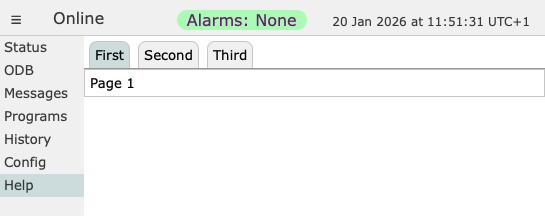
|
|
733
|
15 Dec 2010 |
Stefan Ritt | Info | New source file structure of MSCB tree | A long planned modification of the source file structure of the MSCB subsystem has been implemented. This is however only for those people who do actively participate in micro controller programming with MSCB. The idea behind this is tha the central include file mscbemb.h had a section for each new project. So whenever a new project was added, this file had to be modified which is clumsy and hard to maintain. Therefore I took the project specific sections out of this file and put it into a config.h file, which is separate for each project (very similar to VxWorks). So the folder tree now looks like this:
midas\mscb\embedded
\include <- place for framework include file mscbemb.h
\lib <- precompiled TCP/IP library for SCS-260 submaster
\src <- framework sources mscbmain.c and mscbutil.c
\<project1> <- separate folder for project1
config.h <- config file for project1
\<project2> <- separate folder for project2
config.h <- config file for project2
...
\experiment
\<experiment1>
\<experiment2>
So each project has it's own config.h, which is included from the central mscbemb.h and can be used to enable certain features of the framework without having to change the framework itself. The "projectx" folders contain devices which are used across several experiments and sometimes also between institutes (PSI and TRIUMF). If you make a device which is only used in a specific experiment, this should go under \experiment with the name of the device or the experiment as a subdirectory. I encourage everybody to submit even specific projects to the subversion system since they can sometimes be useful for others to look at some example code.
A few other things have to be changed in order to adapt to the new structure:
- The framework files mscbmain.c mscbutil.c and mscbemb.h have moved and therefore they have to be re-added to the projects in the Keil MicroVision Development Environment.
- The name of the device should not be defined under compiler settings (Project Options/C51/Preprocessor Symbols), but put directly into the config.h file associated with the project.
- The include paths in the compile have to be changed and point to \midas\mscb\embedded\include
- The file config.h has to be copied from a similar project and adjusted to fit the new project.
I did remove all project specific sections from mscbemb.h in the current SVN version, so certain projects (FDB_008 at TRIUMF, CRATE_MONITOR and PT100X8 at PSI) have to retrieve the settings (like LED ports etc.) from the old mscbemb.h and put it into the config.h file.
Furthermore there is a new STARTUP_VDDMON.A51 file in the src directory which should be added to each project. This was recommended by the micro controller manufacturer and fixes cases where the EEPROM contents of the CPU gets lost from time to time during power up.
The last thing is that PSI switched to MicroVision 4 as the development environment, so I added new project files (*.uvproj and *.uvopt instead *.Uv2), but I left the old ones there in case someone still has the uV2 environment. They are however not maintained any more.
If there is any problem with the new structure or you have some comments, please don't hesitate to contact me.
- Stefan |
|
2917
|
06 Dec 2024 |
Stefan Ritt | Info | New slow control framework "mdev" | A new slow control mini-framework has been developed for MIDAS and been successfully tested in the Mu3e experiment. It
might be suited for other experiments as well.
Background
Since the late 90’s we have the three-tier bases slow control framework in MIDAS with class drivers, device drivers and bus
drivers. While it was used successfully since many years, it is complicated to understand and limited in its flexibility. If we
have a HV device with a demand value, a measured voltage and a current it’s fine, but if we want to control more things like
trip voltage, temperature and status readout etc. it soon hits its limits. With the development of the new odbxx API
(https://daq00.triumf.ca/MidasWiki/index.php/Odbxx) there is now an opportunity to make everything much simpler.
Design principles
Instead of a three-tier system, the new “mdev” framework (“m”idas “dev”ices) uses a simple base class which is attached to
a certain MIDAS equipment. It implements five simple functions:
- odb_setup() to setup /Equipment/<name>/Settings and /Equipment/<name>/Variables to its desired structure
- init() to initialize the slow control device
- exit() to close the connection to the device
- loop() which is called periodically to read the device
- read_event() which returns a MIDAS event going to the data stream
A device driver inherits from this base class and implements the functions. A simple example can be found in
midas/drivers/mdev/mdev_mscb.[h,cxx]
for the MSCB field bus system used at TRIUMF and PSI. It basically boils down to two calls:
Init:
m_variables.connect(“/Equipment/<name>/Variables”);
m_variables[“Output”].watch(midas::odb &o) {
m_mscb[“HV”] = o[0]; // transfer value from ODB to MSCB device
}
Reading a value in the loop function:
m_variables[“Input”][0] = m_mscb[“HVMeas”];
The member variable m_variables is a midas::odb variable attached to the “Input” and “Output” variables in the ODB. The
watch() functions executes the lambda function whenever the “Output” in the ODB changes. It then simply transfers the new
value to the device. The reading of measured values just work in the other direction from the device to the ODB.
If you look at the mdev_mscb.cxx code, you see of course some more things like connecting to the MSCB device with proper
error handling, looping over several devices and variables, setting up the “Setting” directory in the ODB to define labels for
all variables. In addition we have a mirror for output variables, so that new values are only sent to the device if they differ
from the previous variable (needed to reduce some communication traffic).
The midas/drivers/mdev directory contains also an example frontend in the mfe.cxx framework, but this is no a requirement.
The mdev framework can also be used in the tmfe framework and others as well. Please note how compact the frontend
code now looks.
User interface
Since the beginning, MIDAS allows access to the the slow control devices through the “equipment” page (on the main status
page, click on one equipment). A few more options can control now the behavior of this page, allowing quite some flexibility
without having to write a dedicated custom page (which of course can still be done). Attached is an example from Mu3e where
the details of the equipment display are controlled through some options in the setting subdirectory as described in
https://daq00.triumf.ca/MidasWiki/index.php//Equipment_ODB_tree (especially the “grid display”, “Editable” and “Format”
flags).
Conclusions
The new “mdev” framework offers a compact and effective way to communicate from MIDAS to slow control devices. Since
all interface code is now not “hidden” any more in system class and device drivers, the user has much higher flexibility in
controlling different devices. If a device has a new parameter, the user can add a single line of code to connect this
parameter to an ODB entry.
The framework is very simple and misses some features of the old system. Ramping of HV voltages and current trips are not
available in the framework (like with the old HV class driver), but modern devices usually implement this in hardware which
is much better. The new framework is not multi-threaded, but modern devices are these day much faster than in the ‘90s.
Since the ODB is thread save, nothing prevents us from putting a device readout into its own thread in the frontend.
We will use the new system for all devices in Mu3e, with probably some new features being added soon, so stay tuned.
/Stefan |
| Attachment 1: PDCC.png
|
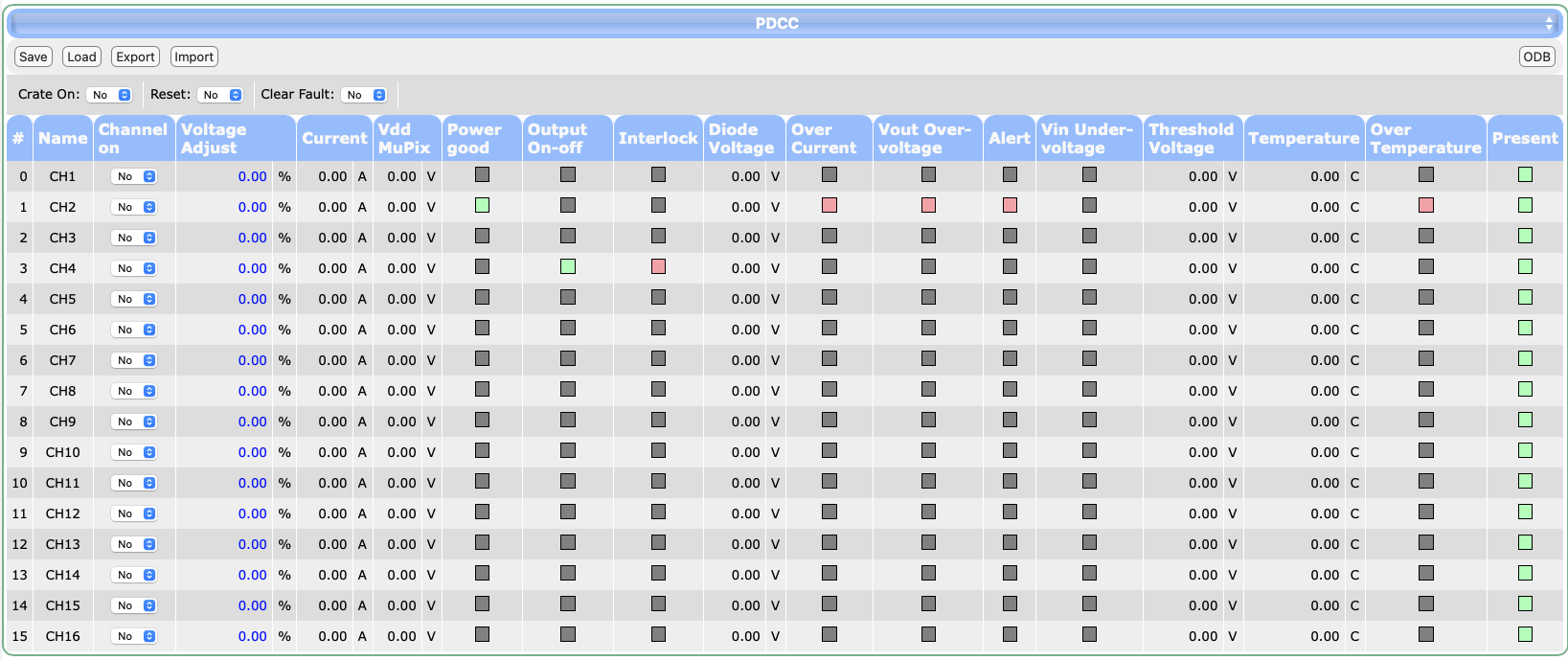
|
|
2892
|
13 Nov 2024 |
Stefan Ritt | Info | New sequencer command ODBLOOKUP | A new sequencer command "ODBLOOKUP" has been implemented, which does a lookup of a string in a string
array in the ODB given by a path and returns its index as a number. If we have for example an array
/Examples/Names
[0] Hello
[1] Test
[2] Other
and do a
ODBLOOKUP "/Examples/Names", "Test", index
we get a index equal 1.
/Stefan |
|
2897
|
15 Nov 2024 |
Konstantin Olchanski | Info | New sequencer command ODBLOOKUP | > A new sequencer command "ODBLOOKUP" has been implemented, which does a lookup of a string in a string
> array in the ODB given by a path and returns its index as a number. If we have for example an array
>
> /Examples/Names
> [0] Hello
> [1] Test
> [2] Other
>
> and do a
>
> ODBLOOKUP "/Examples/Names", "Test", index
>
> we get a index equal 1.
>
"value not found" sets "index" to ?
"odb key not found" sets "index" to ?
link to documentation?
K.O. |
|
2898
|
18 Nov 2024 |
Stefan Ritt | Info | New sequencer command ODBLOOKUP | > "value not found" sets "index" to ?
It sets it actually to "not found". Since all variables are stings in the sequencer, you can then do a test like
ODBLOOKUP ..., index
if ($index == "not found")
...
> "odb key not found" sets "index" to ?
If the odb key is not found, the sequencer aborts.
> link to documentation?
The documentation is where it always has been:
https://daq00.triumf.ca/MidasWiki/index.php/Sequencer#Sequencer_Commands
/Stefan |
|
1169
|
10 Mar 2016 |
Thomas Lindner | Info | New rootana forum | rootana web display tools |
We have started a new elog for discussions of the ROOTANA MIDAS analyzer package
[1], which is used at TRIUMF and elsewhere for quick displays of MIDAS data.
The forum is available here
https://midas.triumf.ca/elog/Rootana
I would note that we have recently finished implementing a system in rootana for
easy web displays of MIDAS data, using ROOT's THttpServer to post histograms.
Details on this new scheme are here
https://midas.triumf.ca/elog/Rootana/1
and
https://midas.triumf.ca/MidasWiki/index.php/Rootana_javascript_displays
Please sign up for the forum if you are interested in getting ROOTANA-related
discussions.
Thomas
[1] https://midas.triumf.ca/MidasWiki/index.php/ROOTANA |
|
1200
|
16 Sep 2016 |
Konstantin Olchanski | Info | New rootana forum | rootana web display tools | > We have started a new elog for discussions of the ROOTANA MIDAS analyzer package
Posting there is almost like talking to oneself - barely anybody is subscribed, not even me.
Hence this reminder.
If you use ROOTANA, click the "config" link, then click the "rootana" checkbutton, then "save".
K.O. |
|
833
|
05 Sep 2012 |
Stefan Ritt | Info | New pipe compression implemented in mlogger | A new pipe compression has been implemented in mlogger thanks to Fedor Ignatov from BINP
Novosibirsk. The way it works that the logger write into a pipe instead directly into a file. The pipe can
then be connected to any compression program without the need to copile against any additional C
library.
To use is, enter as the filename for example
|bzip2>run%05d.mid (note the pipe '|' in front of the bzip2)
This way the data stream is run through the bzip2 program, which is known to have better compression
ratio than gzip. Furthermore, the parallel version of bzip2 can be used, which spreads over all available
CPU cures and speeds up compression almost linearly with the number of cores. This parallel version
called pbzip2 can be found here:
http://compression.ca/pbzip2/
It can be easily compiled and installed. Using this method in the MEG experiment at PSI, we can compress
our waveform data to 37% or it's original size (49% with gzip), and on 8 cores we get a compression rate
of about 40 MBytes/sec (23 MBytes with gzip on a single core).
The disadvantage of that method is that one cannot see the compression ratio online, but this is not a big
deal I guess. The new version has been committed as rev. 5324.
/Stefan |
|
289
|
07 Aug 2006 |
Stefan Ritt | Info | New multi-threaded midas slow control system | Multi-threaded slow control system
The Midas slow control system has been modified to support multi-threaded slow control front-ends. Each device gets it's own thread in the front-end, which has several advantages:
- the communication of all devices runs in parallel and therefor is much faster
- slow devices cannot block any more the front-end. Response times to run transitions etc. become therefore much faster.
This modification requires some minor modifications in the existing class and device drivers.
Dropping of CMD_xxx_ALL commands
The slow control commands CMD_SET_ALL, CMD_GET_ALL, CMD_SET_CURRENT_LIMIT_ALL, CMD_GET_CURRENT_LIMIT_ALL, etc. have been dropped. They were there to accomodate some slow devices, which sometimes works a bit faster if all channels are set or read at once. Since the inter-thread communication scheme implemented now does only allow passing one channel at a time, the "ALL" functions cannot be supported any more. On the other hand this is not such an issue any more, since slow devices are handled now in parallel, speeding up things considereably.
The command have been removed from midas.h and from all device and class drivers coming with the midas distribution. If you have your own drivers, just delete the sections wich use these commands.
Calling the device driver inside the class driver
The device drivers have now to be called differently in the class driver. The reason for that is that in a multi-threaded front-end, there is only one central device driver dispatcher, which communicates with the individual device driver threads. The device drivers do not need to be modified, but all existing class drivers need modification, if they are going to be run in a multi-threaded front-end. Old class drivers which are not used in a multi-threaded front-end do not to be modified.
Following modifications are necessary:
- Remove following line:
#define DRIVER(_i) ...
- Find all lines containing
DRIVER(i)(CMD_xxx, info->dd_info[i], ...)
and replace them with
device_driver(info->driver[i], CMD_xxx, ...)
note that info->dd_info[i] is not passed any more. Instead, you pass info->driver[i]. Pleae note that the arguments passed after CMD_xxx are not checked by the compiler, since they are a variable argument list. Any error there will not produce a compiler warning, but will just crash the front-end.
- Find the line with
status = pequipment->driver[i].dd(CMD_INIT, hKey, &pequipment->driver[i].dd_info,
pequipment->driver[i].channels,
pequipment->driver[i].flags,
pequipment->driver[i].bd);
and replace it with
status = device_driver(&pequipment->driver[i], CMD_INIT, hKey);
- Find the line with
pequipment->driver[i].dd(CMD_EXIT, pequipment->driver[i].dd_info);
and replace it with
device_driver(&pequipment->driver[i], CMD_EXIT);
- Find following lines
hv_info->driver[i] = pequipment->driver[index].dd;
hv_info->dd_info[i] = pequipment->driver[index].dd_info;
hv_info->channel_offset[i] = offset;
hv_info->flags[i] = pequipment->driver[index].flags;
and replace them with
hv_info->driver[i] = &pequipment->driver[index];
hv_info->channel_offset[i] = offset;
The class drivers multi.c and generic.c can be used as a reference for these modifications.
Implementing CMD_STOP command
For multithread-enabled device drivers it is necessary to support the CMD_STOP command, which is needed to stop all device threads before the actual device gets closed. Following code is necessary:
INT cd_xxx(INT cmd, EQUIPMENT * pequipment)
{
INT i, status;
switch (cmd) {
case CMD_INIT:
...
case CMD_STOP:
for (i = 0; pequipment->driver[i].dd != NULL &&
pequipment->driver[i].flags & DF_MULTITHREAD ; i++)
status = device_driver(&pequipment->driver[i], CMD_STOP);
break;
case CMD_IDLE:
...
return status;
}
Enabling multi-thread support
To turn on multi-thread support for a device, the flag DF_MULTITHREAD must be used in the front-end user code device driver list, such as
DEVICE_DRIVER multi_driver[] = {
{"Input", nulldev, 2, null, DF_INPUT | DF_MULTITHREAD},
{"Output", nulldev, 2, null, DF_OUTPUT | DF_MULTITHREAD},
{""}
}; |
|
2355
|
16 Mar 2022 |
Stefan Ritt | Info | New midas sequencer version | A new version of the midas sequencer has been developed and now available in the
develop/seq_eval branch. Many thanks to Lewis Van Winkle and his TinyExpr library
(https://codeplea.com/tinyexpr), which has now been integrated into the sequencer
and allow arbitrary Math expressions. Here is a complete list of new features:
* Math is now possible in all expressions, such as "x = $i*3 + sin($y*pi)^2", or
in "ODBSET /Path/value[$i*2+1], 10"
* "SET <var>,<value>" can be written as "<var>=<value>", but the old syntax is
still possible.
* There are new functions ODBCREATE and ODBDLETE to create and delete ODB keys,
including arrays
* Variable arrays are now possible, like "a[5] = 0" and "MESSAGE $a[5]"
If the branch works for us in the next days and I don't get complaints from
others, I will merge the branch into develop next week.
Stefan |
|
2358
|
22 Mar 2022 |
Stefan Ritt | Info | New midas sequencer version | After several days of testing in various experiments, the new sequencer has
been merged into the develop branch. One more feature was added. The path to
the ODB can now contain variables which are substituted with their values.
Instead writing
ODBSET /Equipment/XYZ/Setting/1/Switch, 1
ODBSET /Equipment/XYZ/Setting/2/Switch, 1
ODBSET /Equipment/XYZ/Setting/3/Switch, 1
one can now write
LOOP i, 3
ODBSET /Equipment/XYZ/Setting/$i/Switch, 1
ENDLOOP
Of course it is not possible for me to test any possible script. So if you
have issues with the new sequencer, please don't hesitate to report them
back to me.
Best,
Stefan |
|
2385
|
15 Apr 2022 |
Stefan Ritt | Info | New midas sequencer version | I prepared some slides about the new features of the sequencer and post it here so
people can have a quick look at get some inspiration.
Stefan |
| Attachment 1: sequencer.pdf
|
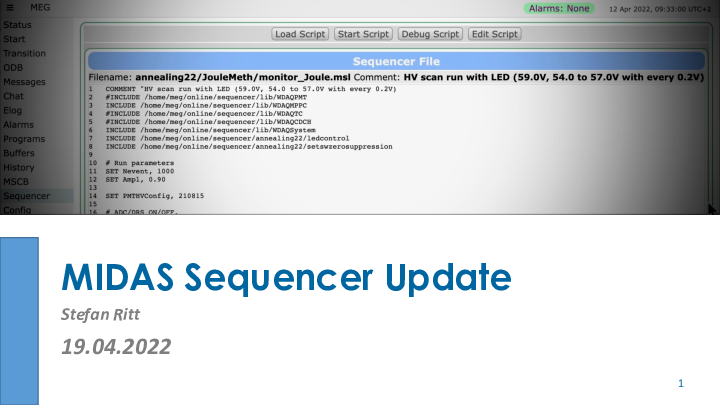
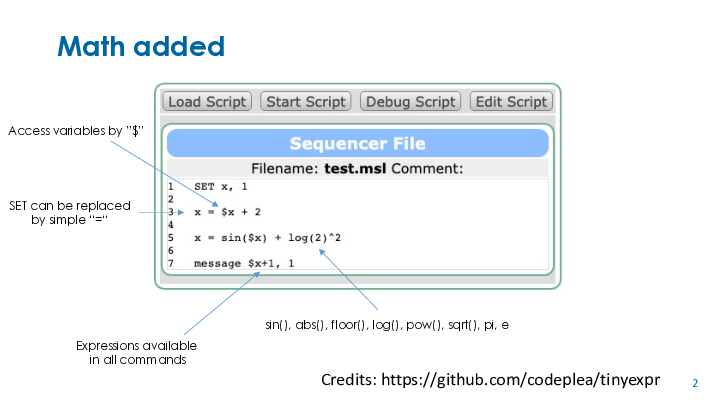
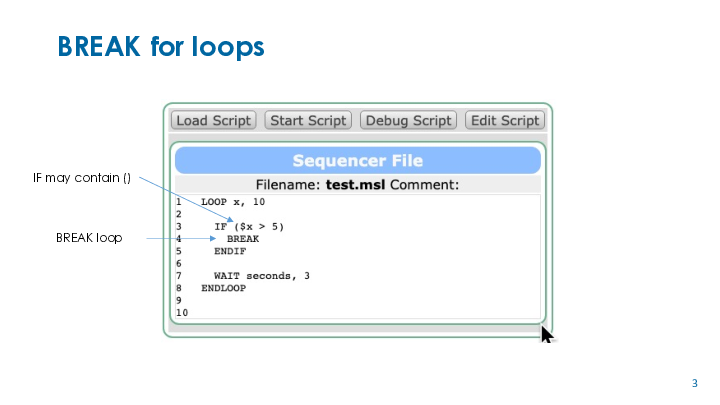
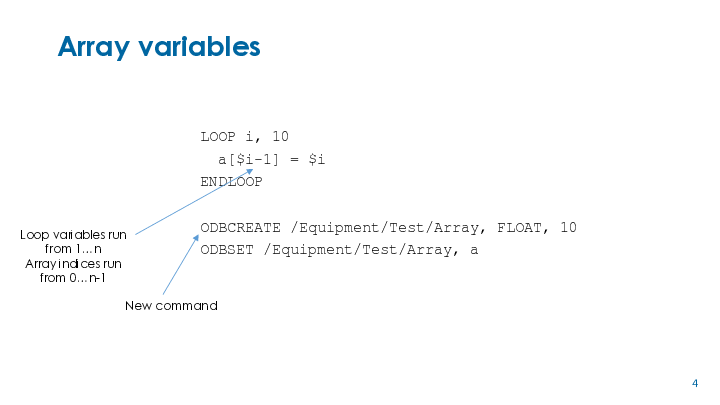
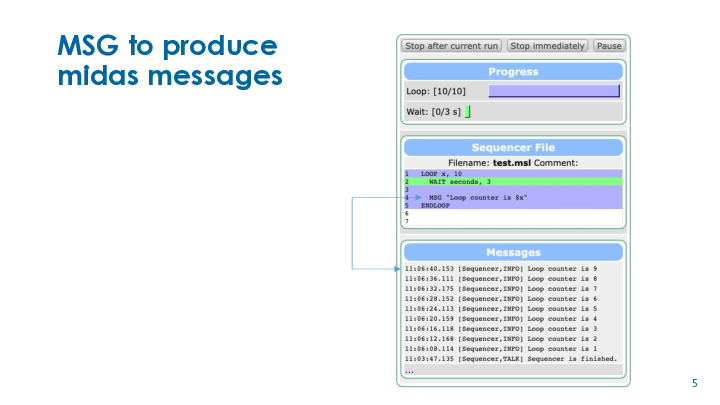
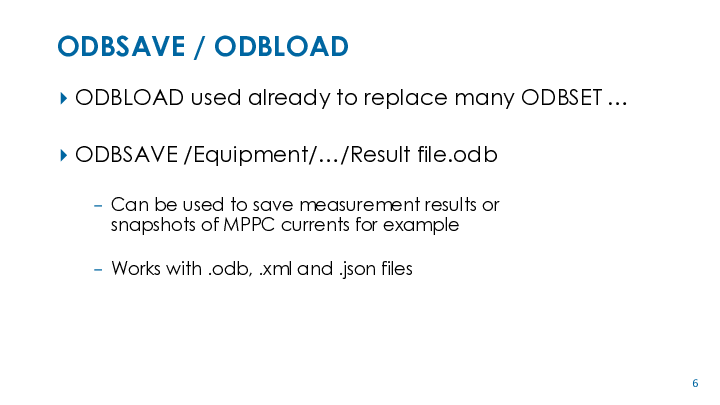
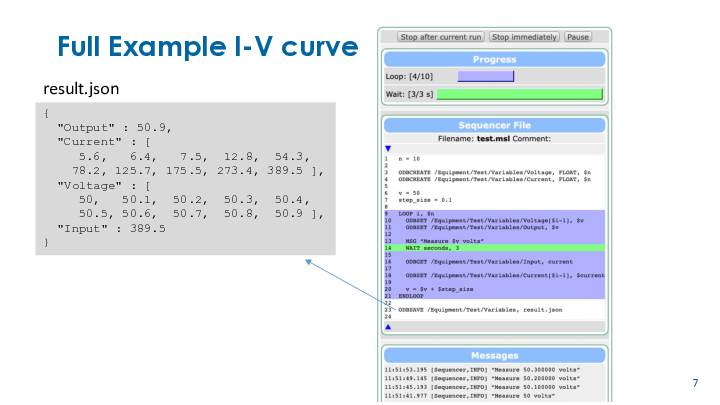
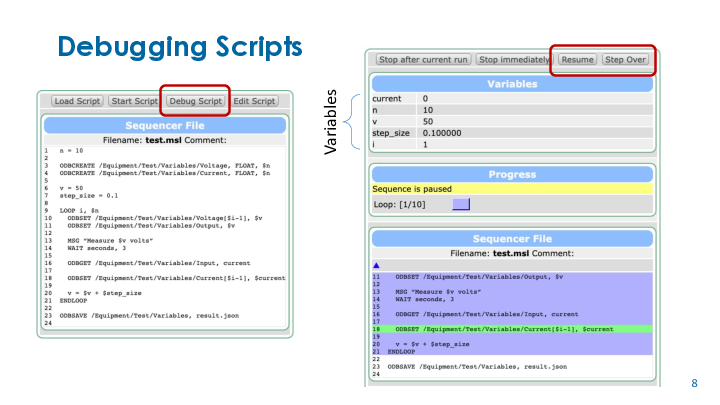
|
|
1958
|
24 Jun 2020 |
Stefan Ritt | Info | New image history system available | I'm happy to report that the Corona Lockdown in Europe also had some positive side
effects: Finally I found time to implement an image history system in midas,
something I wanted to do since many years, but never found time for that.
The idea is that you can incorporate any network-connected WebCam into the midas
history system. You specify an update interval (like one minute) and the logger
fetches regularly images from that webcam. The images are stored as raw files in
the midas history directory, and can be retrieved via the web browser similarly to
the "normal" history. Attached is an image from the MEG Experiment at PSI to give
you some idea.
The cool thing now is that you can go "backwards" in time and browse all stored
images. The buttons at each image allow you to step backward, forward, and play a
movie of images, forward or backward. You can query for a certain date/time and
download a specific image to your local disk. You can even synchronize all time
axes, drag left and right on each image to see your experiment from different
cameras at the same time stamps. You see a blue ribbon below each image which shows
time stamps for which an image is available.
Initially, only the most recent image is loaded to speed up loading time. As soon
as you click on the image or one of the arrow buttons, previous images are loaded
progressively, which you can see in the ribbon bar becoming blue. For slow internet
connections this can take some time. For typical webcams and one minute update
period you get typically a few GB per week.
To make this happen, you define a new ODB subtree
/History/Images/<name>/
Name: Name of Camera
Enabled: Boolean to enable readout of camera
URL URL to fetch an image from the camera
Period Time period in seconds to fetch a new image
Storage hours Number of hours to store the images (0 for infinite)
Extension Image file extension, usually ".jpg" or ".png"
Timescale Initial horizontal time scale (like 8h)
The tricky part is to obtain the URL from your camera. For some cameras you can get
that from the manual, others you have to "hack": Display an image in your browser
using the camera's internal web interface, inspect the source code of your web page
and you get the URL. For AXIS cameras I use, the URL is typically
http://<name>/axis-cgi/jpg/image.cgi
For the Netatmo cameras I have at home (which I used during development in my home
office), the procedure is more complicated, but you can google it. The logger is
now linked against the CURL library to fetch images, so it also support https://.
If libcurl is not installed on your system, the image history functionality will be
disabled.
I tested the system for a few days now and it seem stable, which however does not
mean that it is bug-free. So please report back any issue. The change is committed
to the current develop branch.
I hope this extension helps all those people who are forced to do more remote
monitoring of experiment during these times.
Best,
Stefan |
| Attachment 1: Screenshot_2020-06-24_at_17.21.11_.png
|
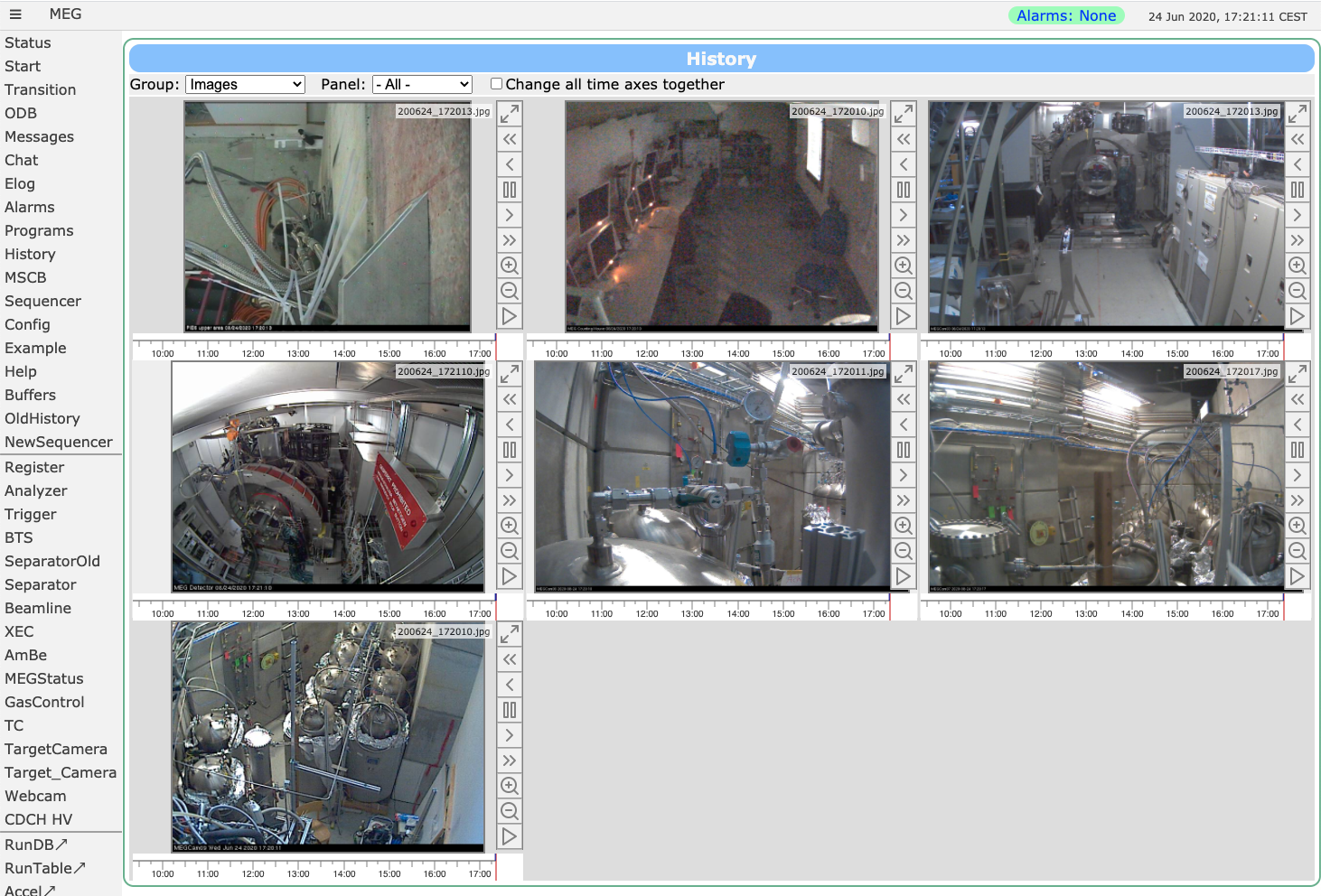
|
|